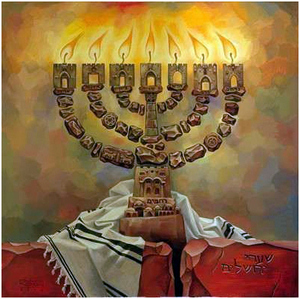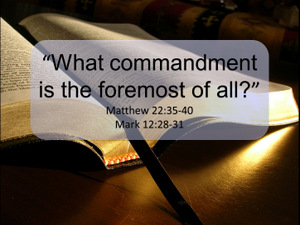The Seven Spirits of G-d
 G-d gave a revelation of the end of time to Yochanan. This revelation is recorded in the book that is named Revelation. In that book it is written:
G-d gave a revelation of the end of time to Yochanan. This revelation is recorded in the book that is named Revelation. In that book it is written:
Revelation 4:1-5
After these things I looked, and behold, a door standing open in heaven, and the first voice which I had heard, like the sound of a trumpet speaking with me, said, "Come up here, and I will show you what must take place after these things." Immediately I was in the Spirit; and behold, a throne was standing in heaven, and One sitting on the throne. And He who was sitting was like a jasper stone and a sardius in appearance; and there was a rainbow around the throne, like an emerald in appearance. Around the throne were twenty-four thrones; and upon the thrones I saw twenty-four elders sitting, clothed in white garments, and golden crowns on their heads. Out from the throne come flashes of lightning and sounds and peals of thunder. And there were seven lamps of fire burning before the throne, which are the seven Spirits of G-d;
Not too long ago as I read this I thought out loud: "Seven Spirits?!? I don't remember seven Spirits. I thought there was only one Spirit of G-d." I had never been taught about seven Spirits. Was this a translation or printing error? Were there any other references in Scripture to seven Spirits? How did this impact my understanding of G-d's character and nature? Why had I always been taught about only one Spirit of G-d?
When we are asked by leaders in our congregations to do something or to believe something in regards to Scripture, we should always be like the Bereans and test everything against Scripture itself (Acts 17:11)... the whole of Scripture (2 Timothy 3:16-17). If a person feels "led by the spirit" to speak, behave, or believe a certain way, they should test that spirit (1 John 4:1) and see whether what that spirit is telling them to do is in agreement or disagreement with Scripture.
Let us take a journey together through Scripture and see what it says about the seven Spirits of G-d... a "walk in the Word" so to speak. As we take this walk, may we say, believe, and do what is right, be merciful in our speech and actions, and walk humbly with the Lord (Micah 6:8).



